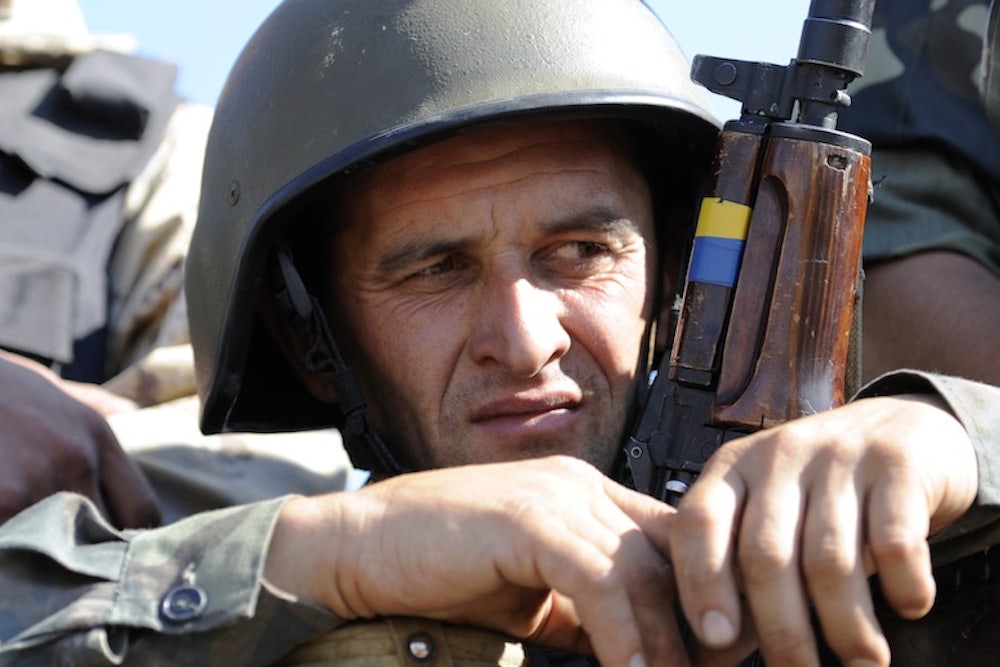In the space of a few days, everything has changed.
According to NATO sources, a thousand Russian soldiers have been on the move in the vicinity of Lugansk for several days now.
Several dozen Russian tanks, including a division flown in from Pskov, crossed the border and, since August 25, have been on maneuvers.
With complete impunity Moscow’s aircraft violate Ukraine’s airspace on a daily basis, flying over the now-encircled positions of the forward units of Kiev’s army.
The Russian navy is endeavoring to open a new front against the strategic port city of Mariupol on the Azov Sea, in the southeastern corner of the country and far from the separatist zones, with a view to clasping the Russian-speaking regions of eastern Ukraine in a pincer movement.
It even appears, according to news reports not yet confirmed, that the Russian army has established a field headquarters in Pobeda, 50 kilometers from Donetsk.
In short, the separatist pantomime is over, and it is toward a new reality that we may be headed: the reality of the first real war in Europe in decades, the first aggression of one sovereign state against another that the former intends to dismember and reduce to vassal status—the very things that the construction of Europe, its reunification, and the end of the Cold War were supposed to have made impossible.
In the face of a dizzying escalation that is gathering speed by the hour, what should we do?
Take the full measure of the threat, first of all.
Use the right words to describe what must indeed be called an aggression—one no longer cold but warming and that may one day, God forbid, become hot—against a European country and therefore against Europe itself.
Move beyond the carefully metered, diplomatically gradual, and cautiously targeted sanctions at which Russia has scoffed and that have in no way cooled its warlike ardor.
And, above all, heed the appeal of Ukrainian President Petro Poroshenko for three very specific things:
Resumption, this Thursday in Cardiff, of the process of rapprochement with NATO, which would have the virtue of making his country’s borders inviolable.
Delivery of the sophisticated weapons without which, as recognized by a growing number of people (in Europe, by Lithuanian president Dalia Grybauskaite; in the United States, by senators John McCain and Robert Menendez, the chair of the Senate Foreign Relations Committee), Kiev’s army, despite its courage and determination, cannot hope to hold out for long against the elite commandos infiltrated by the Kremlin.
And, last but not least, immediate cancellation of the agreements under which France agreed to sell to Russia two Mistral-class warships (one bearing the name “Sebastopol”), which, if delivered, could soon be training their guns on Odessa.
I make no pretense that these decisions are easy to make or implement.
I do not know whether the suggestion that I made three weeks ago to French president François Hollande of having the European Union buy back the contracts has found its way to the ears of other European leaders.
But I do know that the world, thanks to Russian President Vladimir Putin’s adventurism, has entered one of those high-turbulence zones where there is no longer any perfect solution but where we are instead faced with two almost equally fearsome evils.
And of one thing we can be sure.
While the consequences of a show of force are uncertain, the effects of capitulation are crystal clear. Capitulation would:
1. Advance the Russian strongman’s ultimate goal of destabilizing, weakening, and eventually unraveling the European Union.
2. Threaten, by contagion, any border that may happen to pass through a language community and that any nationalistic firebrand will now feel authorized to declare invalid.
3. Deal a heavy blow to a European ideal that was already shrunken, to say the very least, and that would become like an abandoned shell, a phantom in search of its vanished shadow.
4. Neutralize whatever leverage Europe and the United States may have in any negotiations (Iran, Syria, and North Korea, for starters) in which Russia, if only through its role on the Security Council, might be directly or indirectly implicated.
5. Leave Ukraine itself feeling deceived, disenchanted, abandoned, a feeling that I fear would be immediately exploited by extremist movements such as Pravy Sektor, which, at the moment, are tiny minorities but which would perforce raise their heads to contrast their radical nationalist vision with the image of a tired Europe tainted by cowardice and broken promises.
What reasonable person would wish the return of these specters?
Who among us wants to watch in resignation as the hopes of the great democratic and pro-European uprising in the Maidan ice over?
Quickly, in Paris or elsewhere, we need a European summit to support President Poroshenko and defend the new Ukraine.
Translated from the French by Steven B. Kennedy.
